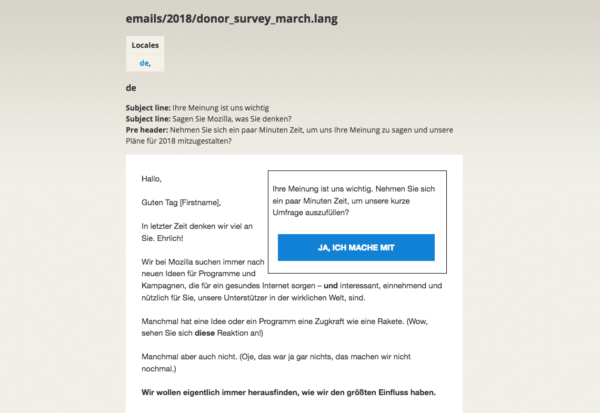Please note some of the information provided in this report may be subject to change as we are sometimes sharing information about projects that are still in early stages and are not final yet.
Welcome!
New localizers:
- Chinese (Simplified): Aragaki Yui
- Catalan: Joan Montané
- Chuvash: Francis Tyers and Anatoly Mironov
- German: Jan
- Greek: Μιχάλης ĺ ľfb
- Polish: Adam Foryś
- Portuguese (Brazil): Mateus Generoso
- Tatar: Ilnar Salimzianov, Mansur Saykhunov, and Francis Tyers
Are you a locale leader and want us to include new members in our upcoming reports? Contact us!
New community/locales added
We enabled several new locales on Pontoon in the past weeks, get in touch if you speak the language and want to contribute:
New content and projects
What’s new or coming up in Firefox desktop
Firefox 59 closed down for localization on February 28, while 60 will remain open until April 25. Firefox 60 is an ESR release, so it’s particularly important to catch up with localization and ensure a good quality in the shipping build.
From a localization point of view, the focus remains on migrating existing Preferences strings to Fluent. We have recently passed the 100 messages milestone, with the migration of the XUL portion of the General pane, and started introducing some of the cool features available in the new localization system.
use-current-pages =
.label =
{ $tabCount ->
[1] Use Current Page
*[other] Use Current Pages
}
.accesskey = C
For more details about this migration, see the announcement on dev-l10n. Also make sure to familiarize yourself with both Pontoon’s UI and Fluent syntax.
More migrations are planned for the 61 Nightly cycle, starting on March 12.
Activity Stream (New Tab) is also planning to integrate its settings in Firefox main preferences for 60: new strings have already landed in the Activity Stream project, a few more will land in mozilla-central.
What’s new or coming up in mobile
There’s a lot going on around mobile this month, so hang on tight!
First of all, Firefox for iOS is soon launching it’s v11. L10n deadline for this is Tuesday, March 13th. This release includes many cool new features and improvements, such as:
- Improved tracking protection
- iPad specific improvements in navigation, drag and drop
- Keyboard support
- Performance telemetry
On the Firefox for Android front, merge day is like for Desktop, so March 12th. The official release is the next day. Locales supported by the Play Store should expect to get an updated string for the What’s New Beta 60 this week. Please remember to check your appstores folder on Pontoon for anything new! 🙂
Firefox for Fire TV v2 is also right around the corner, and the l10n deadline for completion is Mon March 12. Firefox for Fire TV currently supports 8 languages but have no fear – an in-app locale switcher is in the works for future versions. This means we will be able to provide as many languages as we want (well… almost! 😉 ).
Focus for Android is regaining a bit of activity this month, with a few new strings exposed. Something important to note is that the mobile team stopped using Buddybuilds for testing on device. The APKs are on TaskCluster, which will be where you will be heading in order to test your l10n work on (you may need to uninstall your current Buddybuild first though). A v4.1 is expected at the end of the month – more details to come soon.
Focus for iOS continues to be on pause for now. Expect spot releases here and there. As always, stay tuned on the dev-l10n mailing list for any udpates!
On a more or less related topic – Mozilla is participating in the Google Summer of Code project, and we’re looking to mentor students to work on some really cool projects… come check them out (especially the ones related to Pontoon, wink wink)!
What’s new or coming up in web projects
The Common Voice project is Mozilla’s initiative to help teach machines how real people speak. The first time the team that came to speak to the localization communities was the Berlin L10n Workshop last September. The discussion generated a lot of interests and shed some light on the technical challenges as well. There are two parts that made up the project: the web page and the recordings.
Fast forward, the web part of the project is now open to localization. The team has been overwhelmed with enthusiasm and responses. The website is being localized in 17 languages. The project has attracted quite a following. There are new languages added and new contributors introduced to established communities. Thanks to all who helped with onboarding of the new contributors and to our new contributors who join the Mozillian community.
To the locale managers, please review new suggestions and provide constructive feedback to the new localizers in a timely manner. Share glossary and style guide if they are available. Suggest them sign up to web project mailing lists for future updates, and create an account Mozillians.org!
A few words on where the project stands:
- The website on production is in English for now. Localized websites are on staging only.
- The sync between Pontoon and GitHub is every 40 minutes.
- Recording is in English only. However, all speakers, native and non-native, are welcome to create a profile and contribute to the recordings.
- The first non-English recordings will be in Macedonian.
- Additional questions, visit the FAQ page.
What’s new or coming up in Foundation projects
Not a whole lot happening this month on localization on the Foundation side, mostly focusing on collecting feedback from our donors to improve our campaigns and running different campaigns in the U.S.
But the Advocacy team is still prepping up a Copyright push before the JURI vote, which has been delayed once again. And they are also exploring campaign ideas around connected toys that could be launched in certain European markets, but the toys themselves are still being investigated. More to come soon!
What’s new or coming up in Pontoon
In February, a team of Pontoon contributors met in Munich to drill into Translate.Next, our effort at rewriting the translate view of Pontoon and building the foundations of the future of Pontoon as a whole. One of the topics we discussed was how to involve the community in the development of Pontoon more closely. As the first step we created a Pontoon category on Discourse, where we’re hoping to get feedback on proposed developments as well as ideation and problem reports.
Additional way to review localized emails
Reviewing Mozilla localized emails can be challenging, especially when you can’t easily display all the strings at once, strip the HTML code and read it in a format close to what will be sent to subscribers.
Sometimes, inconsistencies or typos are hard to notice before receiving an actual test send proof. While it’s still possible to fix them at this point, it’s much more error prone and requires further edits. And usually, only major issues can be fixed.
This new review mode aims to provide a quick preview of localized emails, even if it can’t replicate everything from the final email template, and does not intent to replace a final review and approval of the test send.
Once you’re done with a first translation, you can proofread the email in its entirety, and adjust your translation if necessary. Translations are pulled automatically from Git every 15 minutes.
If you want to quickly check the source of a string, just hover your cursor over the translation, the English string will appear in a tooltip.
How do I access the review mode?
Simply open this page (also linked in the Engagement project info on Pontoon), find the file you just translated then click the REVIEW button. You can use the top menu to jump to your locale.
We hope you will find it handy! And if not, let us know how we can improve it.
Newly published localizer facing documentation
This was mentioned last month, but it’s always good to have a reminder. Come check out what Kekoa (our l10n intern from last summer) wrote out to help l10n communities (yes, that’s YOU!) write simple – but thorough – style guides.
Make sure to start out by reading the Mozilla General Style Guide first, since it provides the basic guidelines for translating Mozilla products. This guide should be used in coordination with a locale-specific style guide for your language.
Then look at some general guidelines that will help you create your own locale style guide.
We encourage communities to participate actively and create or modify their existing style guides here. Everything is explained in the documentation above, so don’t be shy and give it a try! (or ask anyone from l10n-drivers to help out if you’re not sure how to proceed).
Now, are you interested in learning more about Fluent from a localizer perspective? Then this is just what you need!
Friends of the Lion

Image by Elio Qoshi
- A big thanks to Michal Stanke, from the Czech community, for being a big help in improving our Style guides repository.
- Shout out to Cynthia Pereira for inspiring us in creating the email review mode!
Know someone in your l10n community who’s been doing a great job and should appear here? Contact on of the l10n-drivers and we’ll make sure they get a shout-out (see list at the bottom)!
Useful Links
- Dev.l10n mailing list and Dev.l10n.web mailing list – where project updates happen. If you are a localizer, then you should be following this
- Facebook group: it’s new! Come check it out!
- Telegram (contact one of the l10n-drivers below so we will add you)
- L10n blog
- #l10n irc channel: this wiki page will help you get set up with IRC. For L10n, we use the #l10n channel for all general discussion. You can also find a list of IRC channels in other languages here.
Questions? Want to get involved?
- If you want to get involved, or have any question about l10n, reach out to:
- Delphine – l10n Project Manager for mobile
- Peiying – l10n Project Manager for mozilla.org, marketing, and legal
- Francesco Lodolo (flod) – l10n Project Manager for desktop
- Théo Chevalier – l10n Project Manager for Mozilla Foundation
- Axel (Pike) – l10n Tech Team Lead
- Staś – l20n/FTL tamer
- Zibi (gandalf) – L10n/Intl Platform Software Engineer
- Matjaž – Pontoon dev
- Adrian – Pontoon dev
- Ryan (phlax) – Pontoon dev
- Jeff Beatty (gueroJeff) – l10n-drivers manager
Did you enjoy reading this report? Let us know how we can improve by reaching out to any one of the l10n-drivers listed above.










No comments yet
Post a comment